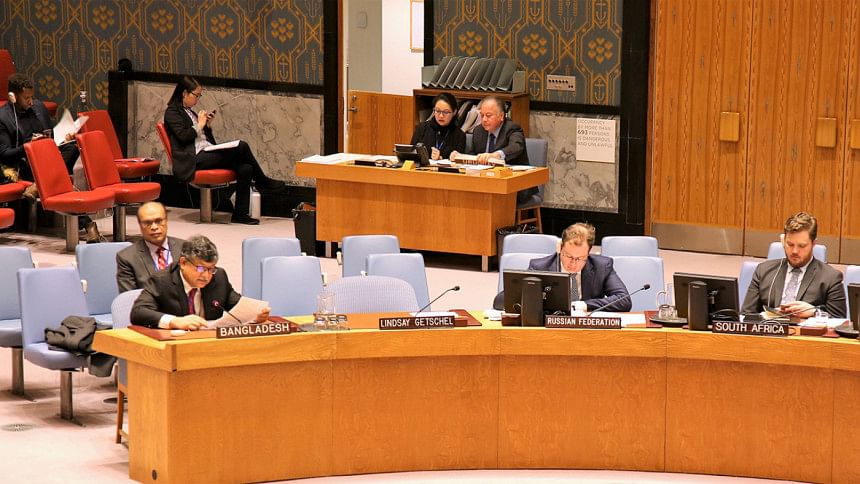Climate Change: Bangladesh seeks finance, tech transfer to vulnerable countries

Bangladesh Permanent Representative to the United Nations Ambassador Masud Bin Momen has called for providing financial resources and ensuring technology transfer to the vulnerable countries, including Bangladesh, to face the threats posed by climate change and related disasters.
"Big emitters must go for rapid mitigation of GHGs. Also, providing financial resources and ensuring technology transfer to the vulnerable countries for their adaptation efforts would be the most effective response to the threats to international peace and security posed by climate change and related disasters," he said.
Momen made the statement at the open debate on "Addressing the impacts of climate-related disasters on international peace and security" at UNSC Chamber in the UN headquarters, New York on Friday, according to a message received in Dhaka
yesterday.
"We must redouble our efforts for sustainable development," he said, adding that Bangladesh is of the firm view that climate change and related disasters must be discussed in international arena.
Masud said, "Bangladesh is one of the worst affected countries by the impacts of global climate change due to its geographical location and is highly prone to natural disasters such as cyclone, flood, landslide and earthquake."
He added, "Climate change poses an existential threat to our 160 million people, although we had hardly contributed to the deterioration of the environment."
Just 1-degree centigrade increase of global temperature and further sea level rise will result in inundation of a large area of Bangladesh and thus displacement of 40 million people by the end of this century, the ambassador said.
Two percent GDP of Bangladesh is regularly lost due to natural calamities and environmental degradation, he said, adding that climate change induced salinity and other disasters are harming rice and other crop production significantly in the country.
"In addition to all these, we have been hosting 1.1 million Rohingyas forcibly displaced from the neighbouring Myanmar. This phenomenon is also impacting our environment severely," Masud said.
He also said despite numerous challenges, at the national level Bangladesh has been able to reduce casualties in incidents of natural disasters in recent times by taking various measures such as improvement in early warning system, dissemination of information, establishment of cyclone shelters and active engagement of dedicated Cyclone Preparedness Program volunteers for preparedness and response activities.
Taken together, these initiatives have significantly increased the nation's capacity to respond proactively to disasters, Masud continued.
"While we emphasise that effective implementation of Paris Agreement and other relevant global documents and mechanisms are must to fight the climate change effects, we are not ignoring the fact that there could be a nexus between climate change and international peace and security, especially in some places for example in Africa and SIDS countries," he said.
"Thus, it is required that the whole UN system should work together to improve our knowledge and understanding to find out if climate change poses any direct threat to peace and security in a specific locality or it is one of the multiplying factors," he added.
The whole UN system should talk in unison for preventing and resolving any crisis that is an evident outcome of adverse effects of climate change, he said.

 For all latest news, follow The Daily Star's Google News channel.
For all latest news, follow The Daily Star's Google News channel. 








Comments